The 2023 Baseball Writers Association of America (BBWAA) Baseball Hall of Fame ballots are out – and that means the 2023 Hall of Fame Debate Season is officially underway! Eligible BBWAA members have until December 31 to cast their ballots (they can vote for up to ten candidates), with results announced January 23, 2023 and the 2023 Induction Ceremony slated for July 23. This year’s traditional ballot includes 14 holdovers from last year, along with an equal number of newcomers. This also means the Baseball Roundtable (unofficial) Baseball Hall of Fame Fan ballot is once again open for voting. This unofficial balloting will officially close on the morning of January 3.
In this post, BBRT will share:
- BBRT’s ballot (if I had one);
- A deep look into all the candidates on the ballot;
- A link to BBRT’s unofficial fan ballot – please take a few minutes to follow the link and cast your votes – you could become eligible for a baseball card and bobblehead surprise package.
––PARTICIPATE IN BASEBALL ROUNDTABLE’S 2023 FANS’ HALL OF FAME BALLOT—
Baseball Roundtable is once again conducting an unofficial fan ballot – to cast your vote(s), click here. Remember, you can vote for up to ten of the nominees for 2023 induction. If you want to read through the nominees’ bios first, there is another link to the BBRT Fan Ballot following the bios (near the end of this post). BBRT will be providing updates on the fan balloting, as well as a post-election comparison of fan votes as compared to the final BBWAA results. Voting on the BBRT Fan Ballot will remain open until January 2, 2023.
Also, if you leave your email address in the Contact Info section at the end of the ballot, you will be entered in a bobblehead and baseball card “surprise-prize” drawing. You will find a link to the ballot after the biographies.
To skip the post and go directly to the fan ballot, click here.
As you consider this year’s slate of candidates, BBRT would stress that all the players on the ballot – even those who remain for only one voting cycle – deserve recognition. To rise to the major leagues, last ten years and make it past the Hall of Fame Screening Committee is a significant accomplishment in itself. In fact, the annual ballot release is a highlight for Baseball Roundtable, as it provides a chance to acknowledge the accomplishments of all the candidates – not just the favorites for election. For example, a review of the ballot gives us the opportunity to honor Matt Cain’s perfect game; Jered Weaver’s no-hitter; Jacob Ellsbury’s 30-30 season; Andre Ethier’s 30-game hitting streak; John Lackey’s two World Series-clinching wins; Bronson Arroyo’s nine straight seasons of 30+ starts; and much more.
Now on to the official 2023 Baseball Hall of Fame election process itself – and, then, a look at the players on the ballot for 2023.
BASEBALL HALL OF FAME ELIGIBILITY/CRITERIA FOR ELECTION
The basic rules for eligibility are that a player must have played at least ten seasons and be retired for at least five years. In addition, the player must be approved for the ballot by the Hall of Fame Screening Committee.
A player can remain on the ballot for up to ten years, but must receive at least five percent of the vote in the preceding year’s ballot to remain on the ballot. Each voter can vote for up to ten candidates. Election requires that a player be named on at least 75 percent of the ballots cast.
The criteria for election: “Voting shall be based upon the player’s record, playing ability, integrity, sportsmanship, character, and contributions to the team(s) on which the player played.”
A few of preliminary comments.
- This year’s ballot is not as crowded with strong newcomers as those as those we have seen in some recent years. In the last five balloting sessions, for example, we have seen Derek Jeter, Mariano Rivera, Roy Halladay, Chipper Jones, Jim Thome, David Ortiz and Ken Griffey Jr. all elected on their first ballots.
- The strongest first-time candidates this year would appear to Carlos Beltran and Francisco Rodriguez.
- The 2023 ballot also includes just one player in his final year of eligibility – Jeff Kent. Players can often expect a “final year” boost in support. Kent, however, was only at 32.7 percent last year, so it would take quite a boost.
- The PED-controversey should play less of a role in this year’s balloting, with some pretty big names dropped from the ballot. (That also may free up some votes for other candidates.)
- The holdovers with the most support year ago are Scott Rolen (63.2 percent); Todd Helton (52.0%); and Bill Wagner (51.0%).
Baseball Roundtable thinks a shutout is very possible this year. The candidates I would rank with the best chance for election appear to be Scott Rolen, Carlos Beltran and Francisco Rodriguez (in that order). Now, let’s take a look at how BBRT would vote if I had a ballot; and, along the way, the bios of these year’s candidates.
Again, to jump directly to the ballot itself, click here.
— PLAYERS WHO WOULD GET BBRT’S VOTE …
Jeff Kent – (Second Base/Third Base/First Base, 1992-2008) … Tenth (final) year on the ballot, 32.7 percent last year.
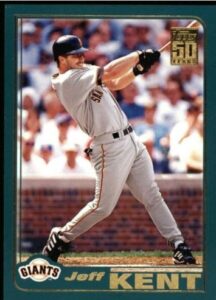 BBRT has long believed Jeff Kent is a deserving candidate, but he has not been getting much support from the writers. Kent holds the all-time MLB record for home runs by a second baseman (351 of his 377 career round trippers were hit while in the lineup at second base). He has a healthy .290 career batting average; his 1,518 RBI are 54th all-time; and his 560 doubles 30th. His 984 extra base hits are 43rd all-time.
BBRT has long believed Jeff Kent is a deserving candidate, but he has not been getting much support from the writers. Kent holds the all-time MLB record for home runs by a second baseman (351 of his 377 career round trippers were hit while in the lineup at second base). He has a healthy .290 career batting average; his 1,518 RBI are 54th all-time; and his 560 doubles 30th. His 984 extra base hits are 43rd all-time.
Kent was a five-time All Star and the 2000 NL MVP. As primarily a middle infielder, he hit 20 or more home runs in 12 seasons (a high of 37 in 2007) and topped 100 RBI eight times. He hit .276, with nine home runs and 23 RBI in 49 post-season games.
Running with the Big Boys …
Jeff Kent has more career runs batted in (1,509 in 17 seasons) than such noted Hall of Famers (who played a comparable number of seasons) as Mickey Mantle (1,508 in 18 seasons), Billy Williams (1,475 in 18 seasons), Eddie Mathews 1,453 in 17 seasons), Duke Snider (1,333 in 18 seasons) and Orlando Cepeda (1,365 in 17 seasons). Not bad for a middle infielder.
Kent has the credentials, but BBRT has a hunch the writers may keep him on the bench – a couple of Gold Gloves, at this traditionally defense-oriented position, would have really helped his case. Kent played for the Blue Jays (1992), Mets (1992-1996), Indians (1996), Giants (1997-2002), Astros (2003-2004) and Dodgers (2005-2008).
Jeff Kent’s Best Season: With the Giants in 2000, Kent put up these stats – 159 games; 196 hits; .334 average; 33 home runs; 125 RBI; 114 runs; 12 steals. His performance earned him the NL MVP Award.
Kent gets BBRT’s vote – and I believe the BBWAA’s support is overdue (but not forthcoming). This is one HOF “snub” that somewhat confuses BBRT. (Over the past three ballots, Kent has moved from 27.5 percent to 32.7 percent. The odds are against him.
_________
Todd Helton – (First Base, 1997-2013) … Fifth year on the ballot, 52.0 percent last year.
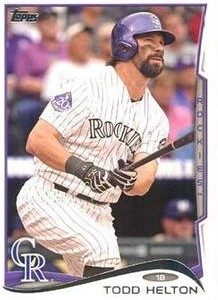 Todd Helton moved from 16.5 percent of the vote to 52 percent between his first and fourth years on the ballot. He faced some pretty strong competition on past ballots and this year’s lighter ballot should help boost his numbers. (I expect he might reach 60-65 percent). Still, he is hampered by the fact that he spent his entire 17-year career with the Rockies (playing half his games in hitter-friendly Coors field). Helton, who put up a .316 career average, hit .345 at home and .287 on the road. Despite that home/road split, Helton’s body of work deserves HOF consideration.
Todd Helton moved from 16.5 percent of the vote to 52 percent between his first and fourth years on the ballot. He faced some pretty strong competition on past ballots and this year’s lighter ballot should help boost his numbers. (I expect he might reach 60-65 percent). Still, he is hampered by the fact that he spent his entire 17-year career with the Rockies (playing half his games in hitter-friendly Coors field). Helton, who put up a .316 career average, hit .345 at home and .287 on the road. Despite that home/road split, Helton’s body of work deserves HOF consideration.
Helton was a five-time All Star, three-time Gold Glover and four-time Silver Slugger. He hit over .300 in 12 seasons – and won the NL batting crown in 2000 with a .372 average. His 59 doubles that season are tied for the seventh-most all-time. Helton drove in 100 or more runs in five seasons and scored in triple figures six times. His 1,335 walks (38th all-time) indicate the respect he earned at the plate. Helton also ranks fifth in games played at first base, third in career assists at the position, 13th in putouts and third in double plays.
400 Rocks
Todd Helton is one of only 18 players to reach 400 or more total bases in a season – and one of only seven players to have multiple 400+ total base campaigns. He is also one of only 12 players with 100 or more extra-base hits in a season; one of only three with multiple seasons with at least 100 extra-base hits and the only player with consecutive seasons of 100 or more extra-base hits (2000-2001).
Todd Helton’s Best Season: In 2000, Helton won the NL batting crown with a .372 average – and also led the league in base hits (216), doubles (59), RBI (147), on-base percentage (.463), slugging percentage (.698) and total bases (405). He also scored 138 runs and hit 42 home runs.
Helton will stay on the ballot and has a chance at entry into the HOF – he’s just not likely to overcome the Coors Field-bias in this year’s voting – the jump from 52 percent may just be too far. He gets BBRT’s vote (as he has in the past).
Francisco Rodriguez – (RHP, 2002-17) – First Year on the Ballot.
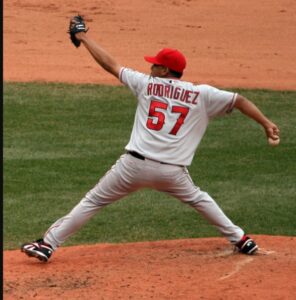
Photo: Toasterb at the English language Wikipedia project, CC BY-SA 3.0 <http://creativecommons.org/licenses/by-sa/3.0/>, via Wikimedia Commons
Francisco Rodriguez played in 16 MLB seasons (2002-17 … Angels, Mets, Brewers, Orioles, Tigers). He went 52-53, 2.86 with 437 saves (fourth all-time) in 948 mound appearances (21st all-time).
Rodriguez was a six-time All Star. He led the AL in saves three times and saved 40 or more games in six seasons and 20 or more in 11. In the five seasons from 2005 through 2009, he averaged 46 saves per season.
Rodriguez had an earned run average under 2.00 in two seasons and under 2.50 in seven campaigns. A true closer, Rodriguez pitched 976 innings in his 948 appearances, fanning 1,142 batters (10.5 per nine innings).
Francisco Rodriguez, who saved 62 games for the 2008 Angels, is the only pitcher in MLB history with 60 or more saves in a season.
In his 2002 debut MLB season, the 20-year-old Rodriguez pitched in 11 post-season games for the Angels – recording five wins (one loss) – giving up four earned runs in 18 2/3 innings, while fanning 28. What makes this especially surprising is that Rodriguez made his MLB debut on September 18 of that season and went 0-0, with no saves in five games (5 2/3 innings). So, he had five post-season victories before he recorded his first regular-season decision of any kind.
Francisco Rodriguez’ Best Season: In 2008 (Angels), Rodriguez saved an all-time record 62 games – in 69 opportunities. He put up two wins (three losses) and a 2.24 ERA in 76 appearances – and fanned 77 batters in 68 1/3 innings.
BBWAA voters have traditionally been very demanding of relievers (although the recent inductions of Mariano Rivera and Trevor Hoffman may be a good sign – but they, of course, both had 600+ saves). It also helps that Lee Smith (478 saves) was elected by the Today’s Game Committee in 2019. I expect Rodriguez to get notable support. There does seem an outside chance he could make it on the first ballot (but I think it would take 500 saves for that honor). I’m looking for votes in the 40-52 percent range.
_________
Billy Wagner – (LHP 1995-2010) … Eighth year on the ballot, 51 percent last year.
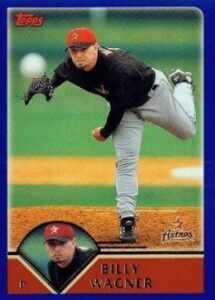 Billy Wagner played for the Astros (1995-2003), Phillies (2004-2005), Mets (2006-2009), Red Sox (2009) and Braves (2010). Wagner was a seven-time All Star, who amassed 422 saves (sixth all-time) in a 16-season MLB career. He had nine seasons of 30 or more saves; a career ERA of 2.31; 1,196 career strikeouts in 903 innings; and 47-40 won-lost record.
Billy Wagner played for the Astros (1995-2003), Phillies (2004-2005), Mets (2006-2009), Red Sox (2009) and Braves (2010). Wagner was a seven-time All Star, who amassed 422 saves (sixth all-time) in a 16-season MLB career. He had nine seasons of 30 or more saves; a career ERA of 2.31; 1,196 career strikeouts in 903 innings; and 47-40 won-lost record.
Whiff-and-Poof
In 1992, playing for Ferrum College, Billy Wagner set an NCAA record for strikeouts per nine innings in a season at 19.3.
Billy Wagner’s Best Season: In 2003, Wagner went 1-4, 1.78 for the Astros, saving 44 games and fanning 105 batters in 86 innings.
BBRT thinks Wagner belongs in the Hall (based on his 400+ saves) – and hopes that momentum continues to build. Wagner has been gaining more support lately – in the last five ballots his percentages have gone 11.1, 16.7, 31.7, 46.4 and 51.0. He should gain more ground in this year’s ballot, but 75 percent may be a bit too much of a jump. I’d like to see Wagner at least move up to the mid-60s. He gets my vote.
__________
Scott Rolen – (Third Base, 1996-2012) … Sixth year on the ballot, 63.2 percent last year.
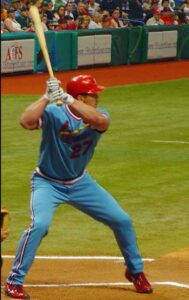
Photo: User Darwin’s Bulldog on en.wikipedia, CC BY-SA 3.0 <http://creativecommons.org/licenses/by-sa/3.0/>, via Wikimedia Commons
Scott Rolen played for the Phillies (1996-2002), Cardinals (2002-2007), Blue Jays (2008-2009) and Reds (2009-2012). Those who read Baseball Roundtable regularly know how I lean toward players who flash the combination of leather and lumber – and Scott Rolen did. The seven-time All Star (including in two of his final three seasons) earned eight Gold Gloves, rapped 316 home runs. and even swiped 118 bases. He finished with a .281 average, 316 home runs, 1,287 RBI, and 1,211 runs scored. Rolen hit 25 or more home runs seven times, with a high of 34 in 2005. He also put up five 100+ RBI seasons, scored 100+ runs in two campaigns and reached double digits in steals five times.
Off to a Good Start …
Scott Rolen was the NL Rookie of the Year in 1997 (.283-21-92, with 16 steals).
Scott Rolen’s Best Season: In 2004, with the Cardinals, Rolen hit career highs in average, home runs and RBI (.314-34-124) and won a Gold Glove.
Rolen has been climbing steadily on the ballot since 2017, his vote percentages have been 10.2, 17.2, 35.3, 52.9 and 63.2. He may not jump all the way to 75 percent this year, but he has a chance and is is moving in the right direction. If only he had hit 400 home runs or led the league in one of the major offensive categories, he might already be there. (Or if his numbers hadn’t been dampened along the way by multiple shoulder surgeries.) He would get Baseball Roundtable’s vote – and has a solid chance to reach the 75 percent threshold within the next couple of ballots.
_________________________________
Carlos Beltran – (Outfield, 1998-2017) … First year on the ballot.

Photo: djprybyl on Flickr (Original version) UCinternational (Crop), CC BY 2.0 <https://creativecommons.org/licenses/by/2.0>, via Wikimedia Commons
Carlos Beltran played in 20 MLB seasons – Royals (1998-2004), Astros (2004. 2017), Mets (2005-2011), Giants (2011), Cardinals (2012-13), Yankees (2014-16) and Rangers (2016). He had his best years with the Mets, making the All Star team in five of seven seasons. (Beltran was a nine-time All Star. )
Let’s Get This Party Started
Beltran was the American League Rookie of the Year in 1999, when he hit .293-22-108 for the Royals, with 27 steals and 112 runs scored.
In his 20 MLB campaigns, Beltran hit .279-435-1,587, with 312 stolen bases and 1,582 runs scored. He ranks in MLB’s top 50 in home runs (47th), RBI (41st) and total bases (34th). His 2,725 hits are 62nd all-time and his 1,582 runs scored 53rd.
Among players with at least 200 stolen base attempts, Carlos Beltran’s 86.4 percent success rate is fourth all-time. With 361 steals, he is the only player in the top 12 (percentage-wise) with more than 200 steals.
Beltran drove in 100 or more runs in eight seasons, scored 100 or more runs in seven seasons, hit 30+ home runs in four campaigns (a high of 41 in 2006), stole 25 or more bases five times (a high of 42 in 2004). He was also a three-time Gold Glover. Beltran was also a solid post season performer, hitting .307-16-42 in 65 post-season games. In 2004, with the Astros, he hit .435, with 20 hits, eight home runs, 14 RBI, 21 runs scored and six steals in 12 post-season games (NL Division Series & NL Championship Series). You read that right, 21 run scored in 12 games.
Carlos Beltran’s Best Season: In 2006, Beltran hit .275, with 41 home runs, 116 RBI, 127 runs scored and 18 stolen bases and also won a Gold Glove. He finished fourth in the NL MVP voting.
Beltran would get Baseball Roundtable’s vote and should finish north of 35 percent in his first year on the ballot. His .279 career average and the fact that he never led the league in any of the major offensive categories may keep some voters from considering him a first-ballot inductee.
______________________________________
Andruw Jones – (CF 1996-2012 … Sixth Year on the ballot, 19.4 percent last year.
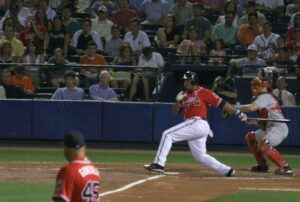
Photo: Carl Fredrickson (Digi360) from Roswell, GA, USA, CC BY 2.0 <https://creativecommons.org/licenses/by/2.0>, via Wikimedia Commons
Andruw Jones played for the Braves (1996-2007), Dodgers (2008), Rangers (2009), White Sox (2010) and Yankees (2011-2012). In a 17-season career – primarily patrolling centerfield – he won ten Gold Gloves (consecutively, 1998-2007). At the plate, he hit .254, with 434 home runs (48th all-time), 1,289 RBI and 1,204 runs scored. He topped 25 home runs in ten seasons (six over thirty and a league-leading and career-high 51 in 2005). He scored 100 or more runs four times, drove in 100+ five times and stole twenty or more bases in a season four times. Jones appeared in 76 post-season games, hitting .273, with ten home runs and 34 RBI.
On the Big Stage ,,,
In the 1996 World Series, Andruw Jones – just 19-years-old – hit .400 (8-for-20) with two home runs and six RBI, becoming the youngest player to go yard in the Fall Classic.
Andrew Jones’ Best Season: In 2005, Jones hit only .263, but led the NL in home runs (51) and RBI (128) – finishing second in the MVP voting to Albert Pujols (.330-41-117).
Jones’ ten Gold Gloves work in his favor, but – over the long haul – that .254 average (he only hit .300 or better once and over .270 only four times) dampen his HOF chances. Still that power and his defense get him Baseball Roundtable’s vote.
___________
Torii Hunter – (OF, 1997-2015) … Third Year on the Ballot year on the ballot.
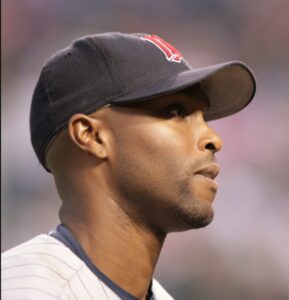
Photo: Keith Allison, CC BY-SA 2.0 <https://creativecommons.org/licenses/by-sa/2.0>, via Wikimedia Commonshoto:
Okay, this may be a bit a a “homer” vote, since Torii Hunter was a star with my home team Twins – but it also reflects my special admiration for “leather and lumber” guys. Torii Hunter played 19 MLB seasons, suiting up for the Twins (1997-2007, 2015), Angels (2008-12) and Tigers 2013-14). He was a five-time All Star, and nine-time Gold Glover.
For his career, Hunter hit .277 (2,452 hits), with 353 home runs, 1,391 RBI, 1,296 runs scored and 195 stolen bases. He hit 20+ home runs in 11 seasons, drove in 100+ runs twice and stole 20+ bases in three campaigns. Hunter hit .274-4-20 in 48 post-season games. Hunter led his league in CF assists three times, CF putouts once and double plays turned out of CF four times. He also led his league’s right fielders in putouts, assists and double plays once each.
Spider-Man
Torii Hunter earned the nicknamed spider-man for his outstanding outfield play.
Torii Hunter’s Best Season: In 2007 (Twins), Hunter hit .287, with 28 home runs, 107 RBI, 94 runs scored and 18 steals – although he can look back on at least four seasons with very similar numbers.
Nine Gold Gloves, five All Star selections and 353 home runs represent some pretty good credentials. Hunter’s chances to make the Hall would have bee better with a couple of standout/spectacular/memorable seasons mixed in with all those consistently very, very good campaigns that fans came to expect.
___________________________________________
Andy Pettitte – (LHP/Starter, 1995-2010, 2012-13) … Fifth year on the ballot, 10.7 percent last year.
As I’ve noted in past years, I had to think for a while on this one (and will probably get some push back from readers), largely because a major part of Andy Pettitte’s HOF resume was achieved in the post-season and there was some PED-controversey surrounding Pettitte. (Note: Pettitte admitted to using HGH while recovering from elbow surgery – a couple of years before the substance was banned. He took responsibility and apologized.)
Pettitte holds the MLB post-season marks for most wins (19 … versus 11 losses), innings pitched (276 2/3), games started (44) and is fourth in strikeouts (183). His post-season accomplishments include a 3.81 career ERA and the 2001 American League Championship Series MVP Award.
Pettitte also was no slouch in the regular season (Yankees – 1995-2003, 2007-2010, 2012-13) and Astros (2004-06). He finished with 256 wins (153 losses) and a 3.85 ERA. His 256 wins currently rank 42nd all-time and his 521 starts 40th. Pettitte won 20 games in two seasons and 14 or more games 12 times – leading the AL with 21 wins in 1996. The three-time All Star struck out 2,448 batters (46th all-time) in 2,316 innings.
Ready, Willing and Able …
Andy Pettitte started 30 or more games in a season 12 times, leading his league three times (1997, 2006, 2007).
Pettitte’s post-season numbers, plus 256 regular-season victories and the fact that he had 100+ more career wins than losses secure BBRT’s vote. He has a long way to go with the BBWAA voters, however, never having gotten more than 13.7 percent of the vote.
Andy Pettitte’s Best Season: In 1997, following a 21-8 campaign in 1996, Pettitte went 18-7, with a 2.88 ERA (fourth-best in the AL), leading the league in starts with 35, finishing third in innings pitched (240 1/3) and eighth in strikeouts (166).
__________
THE REST OF THE SLATE
So, with BBRT’s unofficial ballot covered, let’s look at the remainder of candidates – in alphabetical order. Note: Here you will find a host of players with solid (but perhaps not HOF-level) career numbers and accomplishments – as well as a few that remain on the sidelines for other reasons.
Bobby Abreu – (OF, 1996-2012, 2014) … Fourth Year on the Ballot, 8.6 percent one year ago.
A solid .291 career hitter (2,470 base hits), Abreu hit .300 or better in six seasons. He hit 20 or more round trippers in 10 campaigns, stole 20 or more bases 12 times (a high of 40 in 2004), drove in 100 or more runs eight times and scored at least 100 runs eight times. Abreu also walked 1,476 times – including 100 or more free passes in eight straight seasons (1999-2006).
In the Top 50 …
Bobby Abreu’s 1,476 walks are 20th all-time; his 574 doubles are 25th; his 3,733 putouts as a RF are 12th; and his 130 assists as a RF 28th.
Abreu played for the Astros (1996-97, Phillies (1999-2006), Yankees (2006-2008), Angels (2009-1012), Dodgers (2012) and Mets (2014).
In 20 post-season games, Abreu went 19-for-67 (.284), with one home runs and nine RBI.
Bobby Abreu’s Best Season: In 2004, as a Phillie, Abreu hit .301, with 30 home runs and 40 steals. An All Star that season, he also drove in 105 runs and scored 118.
Abreu’s 400 steals are an HOF plus, as are his 30-40 season in 2004 and his eight campaigns with 100 or more RBI. Had he reached 300 home runs; it would have really boosted his status with the writers. He’s also hurt by the fact that he only made two All Star teams in his 18 seasons.
_____________________
Bronson Arroy0 – (RHP, 2000-2014, 2017) – First Year on the Ballot.
Bronson Arroyo pitched in 16 MLB seasons – Pirates (2000-02), Red Sox (2003-05), Reds (2006-13, 2017) and Diamondbacks (2014). Arroyo went 148-137, 4.28 over his career – 419 games, 383 starts, 16 complete games. He won ten or more games in eight seasons and 14 or more six, with a high of 17 in 2010. He was a one-time All Star and one-time Gold Glover. Arroyo led the NL in innings pitched once, shutouts once and games started twice, He started 30 or more games in nine straight seasons (2005-13).
In 2005, The Bronson Arroyo Band released the Album Covering the Bases – featuring covers of a dozen rock songs by groups from the Goo Goo Dolls to Pearl Jam to Stoner Temple Pilots.
Bronson Arroyo’s Best Season: In 2020, Arroyo went 17-10, 3.88 in 33 starts.
_______________________________________
Mark Buehrle – (LHP, 2000-15) …. Third year on the ballot, 5.8 percent one year ago.
Mark Buehrle pitched in 15 MLB campaigns – White Sox (2000-11), Marlins (2012), Blue Jays (2013-15) – and threw 200 or more innings in all but his rookie and final seasons. Buehrle was a five-time All Star and put up a 214-160, 3.81 record, with 1,870 strikeouts in 3,283 1/3 innings. He twice led his league in starts and twice topped his league in innings pitched. He won ten or more games in 15 consecutive seasons and six times won 15 or more. Buehrle also earned four Gold Glove Awards.
Near-Perfect and Perfect
Mark Buehrle’s HOF resume is bolstered by a no-hitter tossed on April 18, 2007 – when his White Sox topped the Rangers 7-0 and Buehrle faced the minimum 27 batters. The only Texas’ base runner came on a fifth inning, one-out walk to Sammy Sosa, whom Buehrle then picked off first base. Buehrle notched eight strikeouts in the game, which was so-o-o very close to a “perfecto.”
Buehrle got his perfect game two years later (July 23, m 2009), when he recorded a clean slate in a 5-0 ChiSox win over the Rays. He fanned six in that one.
Mark Buehrle’s Best Season: In 2005, Buehrle went 16-8, 3.12 for the White Sox.
If he had 250 wins to go with the no-hitter, perfect game and four Gold Gloves, Buehrle would have had my vote. With just 214 wins, no Cy Young Award and no 20-win season, Buehrle appears short of what voters are looking for. He dropped from 11 percent his first year on the ballot to 5.8 percent in year two.
__________
Matt Cain – (RHP, 2005-17) – First Year on the Ballot.
Matt Cain played 13 MLB seasons (2005-17), all for the Giants. The three-time All Star went 104-118, 3.68 in 342 games (331 starts). He won 12 or more games in five seasons and led the NL in complete games with four in 2009.
On June 13, 2012, Matt Cain threw a perfect game as his Giants topped the Houston Astros 10-0. Cain threw 125 pitches (86 strikes), fanning 14. He reached a three-ball count on only four batters in the gem.
Cain won twelve or more games in five seasons (a high of 16 in 2012). He led the NL with 34 starts in 2008.
Matt Cain’s Best Season: In 2012, Matt Cain went 16-5, 2.79 in 32 starts. He fanned a career-high 193 batters (219 1/3 innings).
________________________________
R.A. Dickey – (RHP, 2001-17) – First Year on the Ballot.
R.A. Dickey pitched in 15 MLB seasons (2001, 2003-06, 2008-17 … Rangers, Mariners, Twins, Mets, Blue Jays, Braves). He went 120-118, 4.04 in 400 games (300 starts). Dickey was a one-time twenty-game winner and won at least ten games in seven seasons. He was a one-time All Star, the 2012 NL Cy Young Award Winner and a one-time Gold Glover.
R.A. Dickey was the first primarily knuckleball pitcher the Cy Young Award.
R.A. Dickey’s Best Season: In 2012, Dickey went 20-6, 2.73 for the Mets – leading the NL in starts (33), complete games (5), shutouts (3); innings pitched (233 2/3); and strikeouts (230). He was an All Star and the NL Cy Young Award winner.
_____________________________________
Jacob Ellsbury – (OF, 2007-2017) – First Year on the Ballot.
Jacob Ellsbury played 11 MLB seasons (2007-17 … Red Sox, Yankees). He was a center fielder with good speed and a good glove – winning one Gold Glove and leading the AL in steals three times, triples once and total bases once. His final stat line was .284-104-512, with 749 runs scored and 343 steals (in 1,235 gamers).
Ellsbury stole 30 or more bases in five seasons (a high of 70 in 2009), scored 90+ runs in four seasons (a high of 119 in 2011) and drove in 100+ runs once. In 2001, Ellsbury hit a career-high 32 home runs – the only season in which he exceeded 16 roundtrippers. The one-time All Star hit .280 in 45 post-season contests (27 runs scored, 17 RBI, 11 steals).
In 2011, Jacob Ellsbury handled 394 fielding chances (154 games) without an error. He also had error-free seasons of more tan 100 games in 2008 (140 games) and 2015 (110 games). The most games played in a single season without an error by an outfielder is 162 (Juan Pierre, White Sox, 2006).
Jacob Ellsbury’s Best Season: In 2011, Jacob Ellsbury joined the 30-30 club – hitting.321, with 32 home runs and 39 stolen bases. That season – his only All star campaign – he set his career-highs in RBI (105), runs (119), hits (212), batting average (.321) doubles (46) home runs (32) and total bases (a league-leading 364). He also won a Gold Glove.
_____________________________________
Andre Ethier – (OF, 2006-17) – First Year on the Ballot.
Andre Ethier played 12 MLB seasons (2006-17), all for the Dodgers. He was a career .285 hitter, with 162 home runs and 687 RBI (in 1,455 games). Ethier was a two-time All Star (2010-11) and one-time Gold Glover. He hit 20 or more home runs in four seasons, with a high of 31 in 2009. He also drove in 100+ runs once, also in 2009. Ethier hit .300+ in two seasons, including .308 in his rookie campaign. He also recorded 30 ore more doubles in seven seasons. Ethier played in 51 post-season games, hitting .246, with five homers and 11 RBI.
After being held hitless in the second game of the 2011 season, Andre Ethier embarked on a 30-game hitting streak (April 2 through May ) – during which he hit .397-3-17. The streak included 11 multi-hit games.
Andre Ethier’s Best Season: Ethier’s best season was 2009, when he hit .272 and reached what would be his career highs in home runs (31), RBI (106), runs scored (92), doubles (42), hits (162), and total bases (303).
_________________________________
J.J. Hardy – (Shortstop, 2006-17) – First Year on the Ballot.
J.J. Hardy played in 13 MLB seasons (2005-17 … Brewers, Twins, Orioles). Hardy was a two-time All Star and a three-time Gold Glover. His final MLB stat line (1,561 games) was .256-188-688, with 718 runs scored. Hardy hit 20+ home runs in five seasons, with a high of 30 for the 2011 Orioles. While he never reached 100 RBI, he did top 75 in four seasons.
J.J. Hardy’s Best Season: Hardy’s best season was 2007 (Brewers), when he was an All Star and hit .277 (his second-highest single-season average), popped 26 home runs (also second highest in his career), drove in a career-high 80 tallies, scored a career-high 89 times and also had a career-high 164 hits.
_________________
John Lackey – (RHP, 2002-17) – First Year on the Ballot.
John Lackey pitched in 15 MLB seasons (2002-11, 2013-17 … Angels, Red Sox, Cardinals, Cubs). He missed the 2012 season recovering from Tommy John surgery. Lackey went 188-147, 3.92 in 448 games (466 starts/18 complete games, eight shutouts.) He fanned 2,294 batters in 2,840 1/3 innings.
Lackey was a one-time All Star and logged at least ten wins in every one of his MLB seasons except his rookie year, when he was 9-4, 3.66 after a late-June MLB debut. Lackey led the AL in shutouts three times (with two each time). His chances for the Hall are dimmed by the the fact that he only recorded at least 15 or more wins in just one season.
John Lackey was 8-6, 3.44 in 29 post-season games. He won the clinching Game Seven in the 2002 World Series (Angels over Giants) and and the title-clinching Game Six in the 2013 World Series (Red Sox over Cardinals).
John Lackey’s Best Season: In 2007, his lone All Star season, Lackey was 19-9 (a career-high in wins). He led the AL in earned run average (3.01), and shutouts (2). He started 33 games and fanned 179 batters in 219 innings.
_______________________________________
Mike Napoli – (C/1B , 2006-16) – First Year on the Ballot.
Mike Napoli played 12 MLB seasons (2006-17 … Angels, Rangers, Red Sox, Indians). He hit .246-267-744, with 697 run scored in 1,392 games. The one-time All Star topped 20 home runs in eight seasons (a high of 30 in 2011) and had 100+ RBI in one campaign.
In Mike Napoli’s first MLB at bat (May 4, 2006), he hit a home runs (leading off the third inning for the Angels) on a 1-2 pitch from Tigers’ starter Justin Verlander. That season, Verlander went 17-9, 3.63 and was the American League Rookie of the Year. Napoli went .228-16-42 in 99 games,
Mike Napoli’s Best Season: In 2011 (for the Rangers), Napoli hit .320, with 30 home runs and 75 RBI (in 113 games). It was his only 30-home season and the only season in which he hit .300 or better.
___________________________________
Jhonny Peralta – (SS/3B, 2003-17) – First Year on the Ballot.
Jhonny Peralta played in 15 MLB seasons (2003-2017 … Indians, Tigers, Cardinals). He was a three-time All Star and hit .267-202-873, with 841 runs scored (in 1,798 games).
Jhonny Peralta made his first All Star team in his ninth MLB season.
Peralta hit 20+ home runs four times, had 75 or more RBI six times and hit .290 or better three times (a high of .303 in 2013).
Jhonny Peralta’s Best Season: In 2011, Jhonny Peralta hit .299, with 21 home runs and 86 RBI for the Tigers.
___________________________________
Alex Rodriguez – (SS/3B, 1994-2013, 2015-16) … Second year on the ballot, 34.3 percent last year.
Alex Rodriguez played 2,784 games over 22 MLB seasons. He hit .295, with 3,115 hits (22nd all-time); 2,021 runs scored (eighth); 696 home runs (fifth) and 2,086 RBI (fourth). He is also among MLB’s top 50 in total bases (seventh); doubles (33rd); walks (36th); and extra-base hits (seventh).
Rodriguez was a three-time league MVP, 14-time All Star and two-time Gold Glover. He led his league in home runs five times and hit 30 or more long balls 14 times (with a high of 57 in 2002). He led his league in runs scored five times (with 100 or more in 13 seasons); led the league in RBI twice, (with 100 or more in 14 seasons and a high of 156 in 2007). He also led the league in hits once; doubles once; average once (.358 in 1996); and total bases four times.
Rodriguez played for the Mariners (1994-2000). Rangers (2001-2003); and Yankees (2004-13 & 2014–16).
Alex Rodriguez’ Best Season: So many to choose from here. Let’s go with his 2007 MVP season (Yankees), when he hit .314; led MLB in runs scored (143), home runs (54) and RBI (156); and led the AL in slugging percentage (.645) and total bases (376).
A-Rod’s numbers belong in the Hall, but I think his 2014 full-year PED-related suspension will keep him on the outside looking in for now. When the PED dam finally cracks (most likely first through Era Committee voting), Rodriguez should find his way intro the Hall. Right now, he has eight years for the voters to change their minds.
____________________________________
Jimmy Rollins – (SS, 2000-2016) … Second year on the ballot, 9.4 percent one year ago.
Jimmy Rollins was a three-time All Star, four-time Gold Glover and the 2007 NL MVP. Over a 17-season MLB career, he hit .264-231-936, with 2,455 hits (115th all-time), 470 steals (46th) and 1,421 runs scored (88th). He led the league in triples four times (topping double-digits in five seasons) and stolen bases once (reaching 30 or more in ten seasons). He also led the NL in runs scored once, and scored 100 or more runs in six campaigns. He ranks 46th all-time in putouts at shortstop, 20th in assists and 12th in double plays. He was truly an “everyday” player, appearing in 150 or more games in ten seasons.
Jimmy Rollins is one of only four MLB players with a 20-20-20-20 season (at least 20 doubles, 20 triples, 20 home runs and 20 steals). See his 2007 “best season” below for details. The others are Curtis Granderson (2007), Willie Mays (1957) and Frank Schulte (1911).
Rollins played for the Philllies (2000-2014); Dodgers (2015); and White Sox (2016).
Jimmy Rollins’ Best Season: In his 2007 MVP season, he hit .296 – with 212 hits, 38 doubles, a league-leading 20 triples, 30 home runs, 94 RBI, a league-leading 139 runs scored and 41 steals.
Rollins’ .264 average and the fact that he made only three All Star squads are negatives for the long haul in balloting. That 20-20-20-20 season, his four Gold Gloves, 470 steals and 1,400+ runs scored should be enough to keep him on the ballot for some time going forward.
____________________________________
Gary Sheffield … (Outfield/Designated Hitter/Third Base/Shortstop, 1988-2009) … Ninth year on the ballot, 40.6 percent last year.
Gary Sheffield played for the Brewers (1988-1991), Padres (1992-1993), Marlins (1993-19998), Dodgers (1998-2001), Braves (2002-2003), Yankees (2004-2006), Tigers (2008) and Mets (2009). Sheffield was a nine-time All Star (in 22 MLB seasons). He launched 509 career home runs (26th all-time) and topped 30 home runs in a season eight times (a high of 43 in 2000). He also maintained a .292 career average (hit .300+ in eight seasons); and collected 1,676 RBI (30th all-time). Sheffield won the 1992 NL batting title (.330); topped 100 RBI eight times; and scored 100 or more runs in a season seven times.
Gary Sheffield is one of only four players to hit MLB home runs as teenagers and in their 40’s. The others are Ty Cobb, Rusty Staub and Alex Rodriguez.
Gary Sheffield’s Best Season: In 1996 (Marlins), Sheffield hit .314, with 42 home runs, 120 RBI, 188 runs scored and 16 steals.
Sheffield has the offensive numbers, but defensive questions and the shadow of PEDs are likely to keep him on the outside looking in for now. He did jump from 13.6 percent of the vote in three years ago to 40.6 percent last year – so that’s progress.
___________________________________
Huston Street – (RHP, 2005-17) – First Year on the Ballot.
Huston Street played in 13 MB seasons (2005-17 … A’s, Rockies, Padres, Angels). Street put up a 42-34 record with a 2.95 earned run average and 324 saves in 668 appearances (all in relief). While he never led the league in saves, he saved 20 or more games in ten seasons (forty or more in two of those). Street was a two-time All Star and the 2005 American League Rookie of the Year, when he went 5-1, 1.72 with 23 saves in 53 appearances for the A’s (as a 21-year-old).
Huston Street’s Best Season: Ironically, Street was trade in the middle of his best season. going from the Padres to the Angels on July 19, 2014. Street was 1-0, 1.09 with 24 saves for the Padres at the time of the trade. He then went 1-2, 1.171 with 17 saves for the Angels – helping them to make the 2014 post season. On the season, he was 202, 1.37, with a career-high 41 saves.
Until BBWAA members vote in those relievers with 400+ saves, Street will have to wait.
_______________
Omar Vizquel – (Shortstop/Third Base, 1989-2012) … Fourth year on the ballot, 23.9 percent last year.
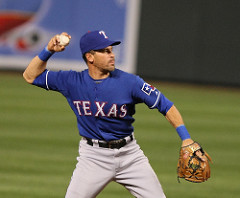
Photo by Keith Allison 
Omar Vizquel got off to a good start toward a HOF plaque, grabbing 37 percent support on his first-ballot year, moving up to 42.8 percent in his second year and 52.6 in his third shot. However, the two most recent ballots have dampened his outlook (he received just 23.9 percent in last year’s voting), perhaps related to off-field concerns . Vizquel who won 11 Gold Gloves, also finished his 24-season MLB career just 123 hits short of that milestone 3,000 safeties.
Vizquel delivered premier defense to the Mariners (1989-1993), Indians (1994-2004), Giants (2005-2008), Rangers (2009), White Sox (2010-2011) and Blue Jays (2012). He was a three-time All Star – and put together a string of nine straight Gold Gloves at shortstop (1993-2001).
Sacrificing for the Team
Omar Vizquel led his league in sacrifice bunts four times.
In the field, Vizquel has the highest career fielding percentage (.9847) among shortstops with at least 500 games at the position. Vizquel is also the all-time leader among shortstops in double plays (1,734), ranks third at the position for career assists and 11th in putouts. He shares the record (with Cal Ripken, Jr.) for the fewest errors by a shortstop in a season of at least 150 games played (three).
On offense, Vizquel put up a serviceable .272 career average, with 80 home runs, 951 RBI and 1,445 runs scored. He also swiped 404 bases – topping twenty steals eight times (a high of 42 in 1999).
Omar Vizquel’s Best Season: In 1999, with the Indians, Vizquel hit a surprising .333, with five home runs, 66 RBI, 112 runs scored and 42 stolen bases – and, of course, won a Gold Glove at shortstop.
As noted,Vizquel’s chances for the Hall have been dampened by off-field issues. (I’ll let readers look those up.)
__________
Jered Weaver – (RHP, 2008-17) – First Year on the Ballot.
Jered Weaver went 150-98, 3.63 in 12 MLB seasons (2006-2017 … Angels, Padres; all but the final season for the Angels). He made 331 appearances (all starts), and had 14 complete games and eight shutouts. Weaver was a three-time All Star and led the American League in wins twice, games started twice and strikeouts once. He won 15 or more games in four season and ten or more a total of ten times.
Jered Weaver finished in the top five in AL Cy Young Award voting in three consecutive seasons (2010-12).
Jered Weaver’s Best Season: In 2012, Weaver led the AL in wins with 20 (nine losses) and put up a 2.81 ERA in 30 starts.
Jered Weaver pitched a no-hitter on May 2, 21012 , as the Angels topped the Twins 9-0. Weaver walked one and fanned nine in the contest.
___________
Jason Werth – (OF, 2002-2017) – First Year on the Ballot.
Jason Werth played 15 MLB seasons (2002-05, 2007-17 … Blue Jays, Dodgers, Phillies, Nationals). He hit .267, with 229 home runs, 888 runs scored and 132 steals in 1,583 games. Werth hit 20 or more home runs in five seasons (a high of 36 in 2009). The one-time All Star also hit 20 or more doubles eight times, leading the league with 46 in 2010. Werth also had 15 post-season homers, to go with a .251 average in 63 post-season games. He scored over 100 runs in one season and hit .290 or better in five.
Jason Werth’s Best Season: In 2009,Jason Werth hit .268 for the Phillies and set career-highs in home runs (36) and RBI (99).
Again, to access Baseball Roundtable’s unofficial Hall of Fame Fan Ballot, click here.
Primary Resources: National Baseball Hall of Fame; Baseball-Reference.com; Baseball-Almanac.com. MLB.com.
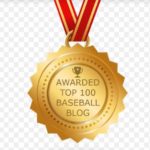 Baseball Roundtable is on the Feedspot list of the Top 100 Baseball Blogs. To see the full list, click here.
Baseball Roundtable is on the Feedspot list of the Top 100 Baseball Blogs. To see the full list, click here.
I tweet (on X) baseball @DavidBaseballRT
Follow Baseball Roundtable’s Facebook Page here. More baseball commentary; blog post notifications.
Member: Society for American Baseball Research (SABR); Negro Leagues Baseball Museum; The Baseball Reliquary.
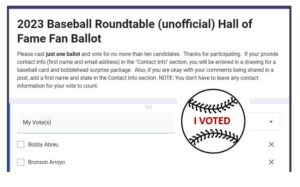
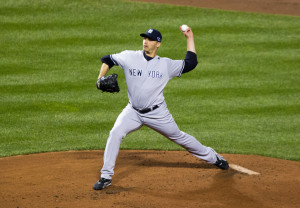
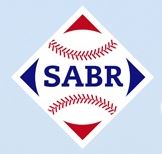
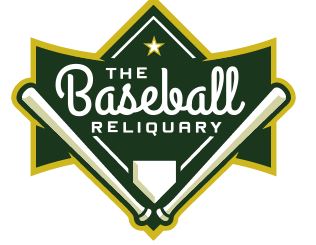
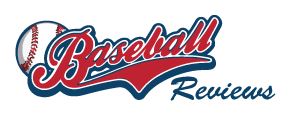



I’m curious to see if anyone finds the story in the link below to be as fascinating as I do. An rarely spoke of insight into our great sport and history of our country. For this reason I feel that both Eddie Klep and Erie Wright would be perfect editions to your shrine.